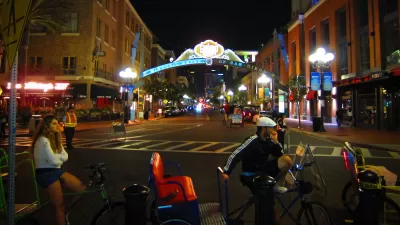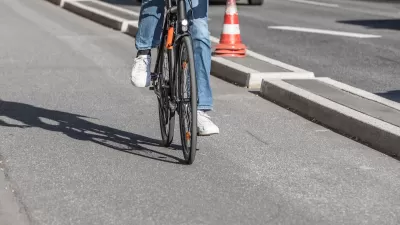AARP finds that 29% of older Americans polled say they are now walking as a way to avoid high gas prices, but 40% say the sidewalks in their area are inadequate.
"A new poll by AARP finds that while many Americans ages 50+ are trying to move away from car transportation as a result of high gas prices, their attempt to go "green" is challenged by inadequate sidewalks and bike lanes, as well as insufficient public transportation options. "More Americans age 50+ are trying to leave their cars behind but face obstacles as soon as they walk out the door, climb on their bikes or head for the bus," said Elinor Ginzler, AARP Senior Vice President for Livable Communities.
Here are a few additional results from the poll that are of particular interest:
• Almost 40 percent of the 50+ Americans polled say sidewalks in their neighborhood are inadequate; 55 percent say that they don't have bike lanes or paths in their neighborhood, and 48 percent say there is not a comfortable place to wait for the bus.
• Yet despite these barriers, about 40 percent of respondents reported they have given up their car for some trips and are walking (29%), taking transit (16%) or riding a bicycle (15%) more often to beat high gas prices.
• Of those who reported an inhospitable environment in their neighborhoods, more than half, 54%, said they would walk, bicycle, and take transit more if their streets were improved. This shows the tremendous unmet potential of our street network to provide more ways to get around.
• A majority of those polled also expressed support for complete streets policies, which ensure that roads are planned, designed, and built for all users. 56% said they were ‘extremely or very' likely to support such policies, and 22% said they were ‘somewhat' likely to be supportive."

Manufactured Crisis: Losing the Nation’s Largest Source of Unsubsidized Affordable Housing
Manufactured housing communities have long been an affordable housing option for millions of people living in the U.S., but that affordability is disappearing rapidly. How did we get here?

Americans May Be Stuck — But Why?
Americans are moving a lot less than they once did, and that is a problem. While Yoni Applebaum, in his highly-publicized article Stuck, gets the reasons badly wrong, it's still important to ask: why are we moving so much less than before?

Research Shows More Roads = More Driving
A national study shows, once again, that increasing road supply induces additional vehicle travel, particularly over the long run.

Judge Halts Enforcement of Anti-Homeless Laws in Grants Pass
The Oregon city will be barred from enforcing two ordinances that prosecute unhoused residents until it increases capacity and accessibility at designated camping sites.

Advancing Sustainability in Los Angeles County Schools
The Los Angeles County Office of Education’s Green Schools Symposium brings together educators, students, and experts to advance sustainability in schools through innovative design, climate resilience strategies, and collaborative learning.

Using Old Oil and Gas Wells for Green Energy Storage
Penn State researchers have found that repurposing abandoned oil and gas wells for geothermal-assisted compressed-air energy storage can boost efficiency, reduce environmental risks, and support clean energy and job transitions.
Urban Design for Planners 1: Software Tools
This six-course series explores essential urban design concepts using open source software and equips planners with the tools they need to participate fully in the urban design process.
Planning for Universal Design
Learn the tools for implementing Universal Design in planning regulations.
City of Moreno Valley
Institute for Housing and Urban Development Studies (IHS)
City of Grandview
Harvard GSD Executive Education
NYU Wagner Graduate School of Public Service
City of Cambridge, Maryland
Newport County Development Council: Connect Greater Newport




























